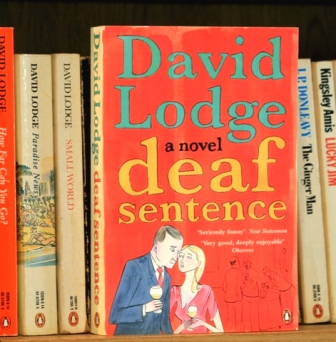
No 14: Deaf Sentence by David Lodge
What’s it about?
Since publishing Nice Work in 1988, David Lodge has made the campus novel genre his own using the backdrop of university life to tell a usually farcical tale in which miscommunication and misadventure abound.
By 2008 and Deaf Sentence, Lodge’s main protagonist is a retired professor of linguistics whose deafness only increases the opportunities for confusion. The narrative is limited; he is approached by a needy postgraduate to help with her thesis on the structure of suicide notes and, having failed to extricate himself, manages to get away without too much damage being caused. Along the way a number of Lodge’s theories on communication in the modern world are aired, some deafness-related information is expounded, along with some tiresome passages on linguistic theory, and a light is shone into a number of crevasses of 21st-century Britain, including chintzy little interior design shops, inter-city travel near Christmas, modern art and, notably, holiday villages.
What’s it got to do with leisure?
One of the funnier set pieces in the book is our hero’s visit to what can only be a Centre Parcs park which he describes with the detachment of Gulliver in Lilliput, at one point describing “Gladeworld” as “A benevolent concentration camp. A benign prison. A happy hell.” His wife embraces the entire experience and joins the other “inmates” who “spend their day toiling up and down, backwards and forwards, on foot or on bicycles, along the macadamed roads and footpaths to various assembly points”. He describes playing various sports “under artificial light and in artificial air” and then describes “Tropical Waterworld”, a “huge geodesic plastic dome enclosing in a heated, humid atmosphere, a complex of swimming pools and water features”. Having listed the attractions on offer, he concludes that were the soundtrack changed to screams of pain rather than laughter and a red filter put "on the lens"to give a fiery glow to the spectacle” you would think yourself in a modern version on Dante’s Inferno.
Why should I read it?
To quote the rhymester Robert Burns, “O wad some Power the giftie gie us, To see oursels as others see us!” Lodge gives the leisure centre manager, the art gallery curator and the operator of the luxury day spa the opportunity to look at their offer through the implacable filter of an ingenue at the sport, leisure and culture ball. There’s also some funny stuff on deafness, and only someone who is hard of hearing is allowed to say that; some clever stuff on the meaning of meaning (you’ll have to read it now); and a chilling account of a visit to Auschwitz, which though it sounds incongruous here is woven into the narrative and the semiology of the novel seamlessly. Lodge is a clever man who accesses the innocence of the boy who saw the emperor naked and applies its prism quite mercilessly. Leisure managers should read the book but perhaps from behind the sofa.
the leisure manager’s library
An occasional series offering a guide to leisure-related literature
